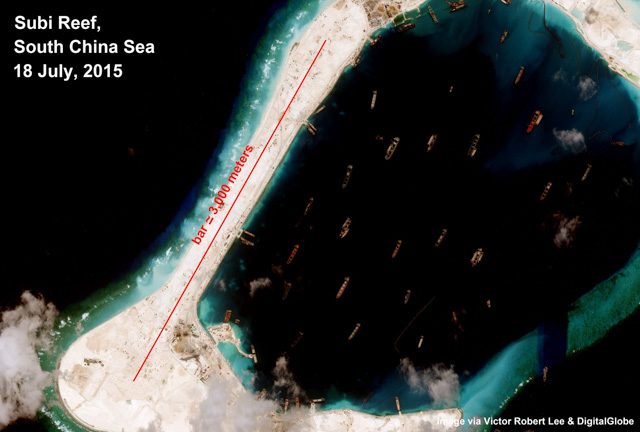SUMMARY
This is AI generated summarization, which may have errors. For context, always refer to the full article.

KUALA LUMPUR, Malaysia – China said its much criticized land reclamation and island-building in the South China Sea will benefit other countries with claims to the resource-rich waters.
Chinese Vice Foreign Minister Liu Zhenmin said Beijing will continue its construction activities despite calls from US President Barack Obama and Philippine President Benigno Aquino III to stop the work to reduce tensions.
He said China even wants to “expand and upgrade” its facilities in the reefs, rocks, and shoals “to better serve commercial ships, fishermen, to help distressed vessels and provide more public services.”
Liu held a press briefing at the sidelines of the Association of Southeast Asian Nations (ASEAN) summit and related meetings here on Sunday, November 22.
China has been constructing facilities in 7 disputed features in the South China Sea. The facilities include runways and military outposts. Beijing has said that the facilities also serves civilian purposes like disaster response, research and search and rescue efforts.
Echoing Chinese President Xi Jinping’s remarks in the US last September, Liu said the construction activities do not constitute “militarization.”
“To build necessary military defense facilities on islands far away from our mainland is both required by the national defense need and the need to safeguard our islands and reefs. They should not be mistaken for the militarization of the South China Sea,” he said.
Liu turned the tables on the US, criticizing its decision to send a destroyer and bomber planes near the artificial islands.
“Some major countries outside the region are exercising their so-called freedom of navigation by sending airplanes and warships while strengthening military cooperation with countries in the region. Is that a trend of militarization?”
Washington said that its so-called freedom of navigation patrols are meant to show that the artificial islands do not generate maritime rights, and the area remains international waters.
The South China Sea is a vital waterway through which $5 trillion in global commerce passes every year. It is also a rich fishing ground, and is believed to hold oil and gas reserves.
The Philippines, Vietnam, Malaysia, Brunei, and Taiwan also have claims to the sea.
PH skeptical of statement
Aquino was skeptical of Liu’s statement about the artificial islands.
He pointed out that China claims “indisputable sovereignty” over practically the entire sea.
“They say they have sovereignty, right? [Now they say] it is open to all. It’s a statement. Is there something operational after that? Maybe the next question will be they might push for a new island to have a 12-mile privilege, territorial waters with requirements. In that case, we should release a Code of Conduct,” Aquino told reporters here on Sunday.
The President was referring to a much delayed legally-binding agreement between ASEAN and China that will set rules on the dispute. (READ: Aquino to China: Take the lead in sea row pact)
Aquino then turned diplomatic, expressing hope that the Chinese government was sincere in its remarks.
“We hope that would be the case. We hope that while it is being reclaimed, it causes tension [but] once it’s built, hopefully it will be the avenue to achieve better relations with each other. If they really intend it to be used by all other parties then hopefully that will be the outcome: the reverse of the tensions it’s carrying out,” he said.
China’s land reclamation is among the activities that the Philippines is questioning before an arbitral tribunal based at The Hague.
Hearings on the merits of Manila’s historic arbitration case will begin on November 24, just two days after the conclusion of the ASEAN summit.
More countries vocal about dispute
Aquino said that more countries are now vocal about the dispute compared to when he first attended ASEAN meetings in 2010.
This is Aquino’s last ASEAN summit as he steps down in 2016.
The South China Sea was a key topic of the gathering of 18 world leaders at the East Asia Summit. The summit includes ASEAN and dialogue partners Australia, China, Japan, India, New Zealand, South Korea, Russia, the United States. (READ: Aquino to China: Why bar us from our own waters?)
“Perhaps not to the same degree as us, some a lesser degree, some a higher degree, but everybody was conscious that there really [is] an issue [here with] land reclamation and we are pushing – including China, in fairness, had to publicly state – everybody was publicly stating, ‘Let us come up with a Code of Conduct at the soonest possible time,’ including China reiterated that tone,” Aquino said.
The President pointed out that in past years, it was difficult to get consensus on the maritime row. For the first time, ASEAN ministers failed to issue a joint communique in the 2012 meeting in Cambodia due to differences over the dispute.
Now in the summits in Malaysia, Aquino was not alone in raising the topic.
Obama, Japanese Prime Minister Shinzo Abe, and Indian Prime Minister Narendra Modi all called for a peaceful resolution of the sea row. – Rappler.com
Add a comment
How does this make you feel?
There are no comments yet. Add your comment to start the conversation.